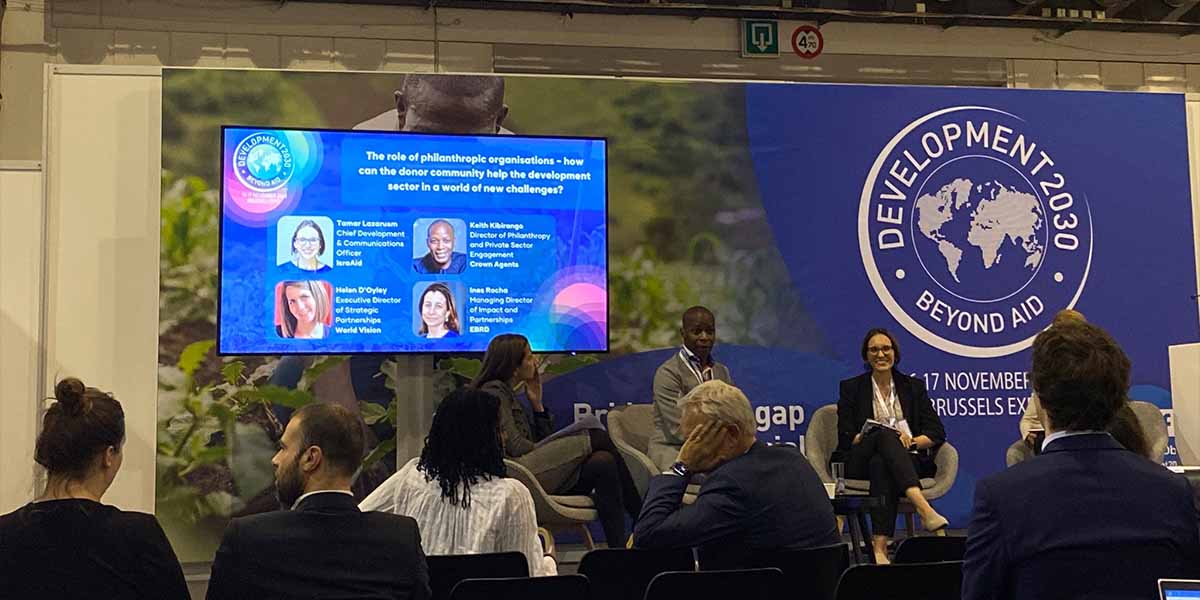Despite there only being twelve months since the last AidEx event, it felt as though many years had passed. With pandemic related travel restrictions now a thing of the past, the footfall was considerably bigger; indeed attendees were only reminded of the events of the past two years when moderator Hans-Peter Teufers appeared via Microsoft Teams, confessing he had tested positive for covid earlier in the week.
There was a clear trend in terms of the discussion points at this years conference; funding, finance and philanthropy. From innovative finance, to impact investment, no stone was left unturned as speakers with a wide range of experience discussed all things monetary and partnerships. A panel of particular interest was ‘international development funding: how to obtain sustainable financing in a post pandemic world’, featuring speakers from FinnFund (Juho Uusihakala, Head of Impact), OECD (Priscilla Boiardi, Policy Analyst, Private Finance for Sustainable Development), Norsad Capital (Kay Malela, ESG and Impact Partner) and Steward Redqueen (Teodora Nenova, Partner). Alarmingly, but not unsurprisingly, we were reminded that the predicated amount of funding to achieve the SDGs alone per year (not including climate change measures), had almost doubled since the start of the COVID-19 pandemic. A big question, therefore, was how to avoid impact-washing when it comes to investment, and whether increasing regulations would discourage companies from investing, at a time when more money is needed than ever before.
The panel shared mixed views on this, suggesting that regulation and standards can be demanding but that they hope that’s not a reason to be discouraged. It’s not often that a company would meet all requirements, but organisations should have a mandate themselves and let this guide them. Focusing on strengths can indeed achieve a bigger impact, rather than spreading it too thinly, such as addressing gender issues and biodiversity; both hugely different problems in very different contexts. When asked how we can scale up funding, focus was placed on the importance of relationships and trust in funding. (To learn more about this- please see this recording from one of our previous Knowledge Festivals). Other key takeaways were the need for more data and transparency to assess which approaches work, so they can be replicated and scaled, and the desire for more early-stage financing for smaller organisations who have not yet enjoyed international funding.
The following panel was titled ‘Next Generation Partnerships – a win-win approach for private sector, NGOs and recipient countries, or is there a danger of impact washing?’ This conversation focused heavily on the role of the NGO; especially that they should play the role of a critical friend, challenging the private partner if needed and holding high levels of accountability for the communities they serve. It was clear from the speakers (Hans-Peter Teufers, Director of International Programs, UPS Foundation; Katherine Price, Head of Partnerships Global Health, Save the Children; Lionel Bodin, Managing Director & Europe Lead, Accenture Development Partnerships; Nabeel Goheer, Chief of Asia, Middle East and Europe Region, PATH), that the most important aspect for a win-win partnership is to have the space for a long-term relationship. It was recognized that this can be challenging, especially when needing to demonstrate impact to the Board and shareholders. An especially poignant point was raised when the panel highlighted that recent world events such as the war in Ukraine and the Black Lives Matter protests, have shown the private sector how everything is interconnected, and how conceptual reframing would be more respectful as the landscape shifts.
The final panel of the day was ‘The Role of Philanthropic Organisations – How can the Donor Community Help the Development Sector in a World of New Challenges’, where key considerations were the three C’s: Conflict, Climate and Covid. Again there was an emphasis on partnerships as a relationship rather than a transaction, and how the non-traditional donor base needs to be expanded as they are the organisations that have more flexibility and who can take more risk with less restrictions. It was also noted that we should involve these actors in neglected emergencies because they can respond fast. Keith Kibirango (Director of Philanthropy and Private Sector Engagement, Crown Agents) and Helen D’Oyley (Executive Director of Strategic Partnerships, World Vision), spoke candidly about recognizing the power dynamics inherent within the funding landscape and the importance of local insight, especially using a holistic lens. For example, donors may be interested in education programmes in places where children aren’t eating enough; funding flows sometimes don’t allow for this type of vision.
Philanthropy is critical, it’s the future. It can test, innovate and be catalytic.

Ruth Davis
Ruth joined Oxford HR in 2018 after graduating from the London School of Economics and Political Science. She is particularly passionate about social impact and how purpose-led businesses can communicate their impact. Working within the communications team at Oxford HR, Ruth works on supporting regional hubs with their marketing needs in addition to content creation and partnerships. She also leads on measuring Oxford HR’s impact as a business and is part of the BCorp working group.
Ruth holds a Certificate in Professional Marketing from the Chartered Institute of Marketing, a Certificate in Project Fundamentals and is learning French. She is currently studying MSc Sustainable Development at the University of Sussex/Institute of Development Studies.



